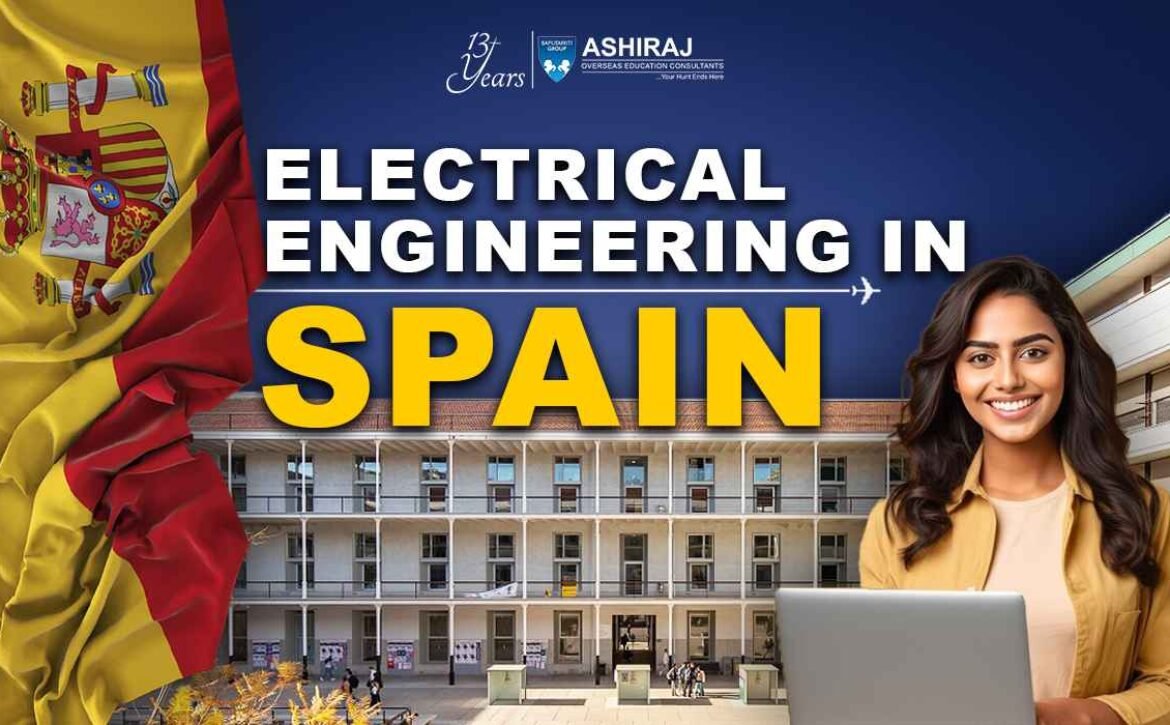
Electrical Engineering in Spain
Electrical Engineering in Spain offers a robust academic environment combined with innovative research opportunities. Spanning from cutting-edge technologies to sustainable energy solutions, Spain’s programs in Electrical Engineering are highly regarded globally. Universities across Spain, such as Universidad Politécnica de Madrid and Universidad de Barcelona, offer diverse specialisations, including power systems, electronics, and telecommunications. These programs emphasise practical skills alongside theoretical knowledge, preparing students for dynamic careers in industries like renewable energy, telecommunications, and automation. The curriculum often includes hands-on lab sessions and industry collaborations, ensuring graduates are well-equipped for the demands of the modern technological landscape in Spain and beyond.
In Spain, pursuing Electrical Engineering not only opens doors to a wide range of career possibilities but also allows students to immerse themselves in a vibrant cultural and academic atmosphere. The country’s commitment to innovation and sustainability further enhances the appeal of studying Electrical Engineering here, making it an ideal choice for those seeking a comprehensive and forward-looking education in this dynamic field.
Why to Study Electrical Engineering in Spain?
- High-Quality Education: Spanish universities, such as Universidad Politécnica de Madrid and Universidad de Barcelona, offer top-notch Electrical Engineering programs with comprehensive curricula.
- Innovative Research Opportunities: Electrical Engineering in SPAIN is renowned for its cutting-edge research, especially in areas like renewable energy, smart grids, and telecommunications.
- Practical Experience: Programs emphasize hands-on training through labs, internships, and industry collaborations, ensuring students gain practical skills.
- Diverse Specializations: Students can specialize in various fields within Electrical Engineering, including power systems, electronics, and automation.
- Global Recognition: Degrees from Spanish universities are recognized worldwide, enhancing career prospects both in Spain and internationally.
- Industry Connections: Strong links with leading companies in the engineering sector provide students with networking opportunities and potential job placements.
- Cultural Experience: Studying Electrical Engineering in SPAIN offers an enriching cultural experience, allowing students to enjoy the country’s rich history, cuisine, and vibrant lifestyle.
- Affordable Education: Compared to other European countries, Spain offers quality education at relatively affordable tuition fees.
- Multilingual Programs: Many universities offer programs in both Spanish and English, catering to international students.
- Sustainable Focus: Spain’s commitment to sustainability and renewable energy aligns well with the growing emphasis on eco-friendly engineering solutions.
Top Universities to Study Electrical Engineering in Spain
University | QS World University Rankings 2023 | Type of University | Average Annual Fees (EUR) | Programs Offered |
Universidad Politécnica de Madrid | 451-500 | Public | 1,500 – 2,500 | Electrical Engineering, Electronics Engineering |
Universidad de Barcelona | 178 | Public | 2,000 – 3,000 | Electrical Engineering, Telecommunications |
Universidad Politécnica de Cataluña | 310 | Public | 1,500 – 2,500 | Electrical Engineering, Automation and Robotics |
Universidad Carlos III de Madrid | 351-400 | Public | 2,000 – 3,500 | Electrical Engineering, Power Systems Engineering |
Universidad de Zaragoza | 601-650 | Public | 1,000 – 2,000 | Electrical Engineering, Renewable Energy Systems |
Electrical Engineering in SPAIN is a prestigious field, with several universities offering high-quality education and diverse programs. These top institutions not only provide a strong theoretical foundation but also emphasize practical experience and innovative research opportunities. The average annual fees are relatively affordable, making Spain an attractive destination for students aspiring to excel in Electrical Engineering.
Course Curriculum for Electrical Engineering in Spain
- Core Subjects: The curriculum for Electrical Engineering in SPAIN includes foundational courses such as circuit theory, electromagnetics, digital systems, and control systems.
- Mathematics and Physics: Students undertake extensive coursework in advanced mathematics and physics to build a strong analytical foundation.
- Electronics: Courses cover analog and digital electronics, microprocessors, and semiconductor devices, essential for modern electrical engineering applications.
- Power Systems: Students learn about power generation, transmission, distribution, and the operation of electrical machines and power electronics.
- Telecommunications: The curriculum often includes subjects related to signal processing, wireless communications, and network theory.
- Control Engineering: Topics such as feedback control systems, automation, and robotics are integral to the course.
- Computer Programming: Programming languages and software tools relevant to electrical engineering are taught, including C++, MATLAB, and Python.
- Laboratory Work: Practical lab sessions allow students to apply theoretical knowledge to real-world scenarios and gain hands-on experience with electrical systems and devices.
- Project Work: Students complete individual and group projects, often collaborating with industry partners, to solve complex engineering problems.
- Electives and Specializations: The curriculum offers elective courses in areas like renewable energy, smart grids, and embedded systems, allowing students to tailor their studies to their interests.
The course curriculum for Electrical Engineering in SPAIN is designed to equip students with a comprehensive and practical education, preparing them for diverse careers in the field.
Eligibility Criteria & Admission Requirements for MS in Electrical Engineering in Spain
- Academic Requirements: Applicants must have completed secondary education or equivalent with strong grades in mathematics and physics.
- Language Proficiency: Non-native English speakers must demonstrate proficiency in English through standardized tests.
- Entrance Exams: Depending on the university, scores from GRE or GMAT may be required.
Test | Minimum Score |
IELTS | 6.0 – 6.5 |
TOEFL | 80 – 90 |
GRE | 300+ |
GMAT | 600+ |
- Passport & Student Visa: A valid passport and a student visa are mandatory for international students.
- Academic Certificates: Official transcripts and certificates from previous educational institutions must be provided.
- Work Experience: While not always mandatory, relevant work experience in engineering or related fields can strengthen the application.
- Letters of Recommendation: Universities often require two to three letters of recommendation from previous teachers or employers.
- Statement of Purpose: A personal statement outlining the applicant’s motivations, goals, and reasons for choosing Electrical Engineering in SPAIN.
- Curriculum Vitae (CV): A detailed CV highlighting academic achievements, extracurricular activities, and any relevant experience.
Meeting these eligibility criteria is essential for securing admission to Electrical Engineering programs in Spain, ensuring that students are well-prepared for the rigorous academic environment.
Documents Required for Studying Electrical Engineering in Spain
- Passport: A valid passport is required for the entire duration of the study period in Spain.
- Letters of Recommendation (LOR): Typically, two letters of recommendation from teachers or employers who can attest to the applicant’s academic and professional capabilities.
- Statement of Purpose (SOP): A detailed essay explaining the applicant’s motivation, goals, and reasons for choosing Electrical Engineering in SPAIN.
- Curriculum Vitae (CV): A comprehensive CV that outlines academic achievements, work experience, extracurricular activities, and any relevant skills.
- Official High School Transcripts: Certified copies of transcripts and certificates from previous educational institutions, demonstrating strong performance in relevant subjects like mathematics and physics.
- Certificates: Any additional certificates of academic or extracurricular achievements that may support the application.
- Work Experience Certificate: If applicable, proof of relevant work experience in the engineering field or related areas.
- Proof of Financial Resources: Documentation showing sufficient financial resources to cover tuition fees and living expenses during the stay in Spain.
These documents are essential for the application process and help universities assess the applicant’s qualifications and readiness for Electrical Engineering in SPAIN. Ensuring all documents are complete and properly certified will aid in a smooth admission process.
Admission Process for Electrical Engineering in Spain
- Research Universities: Begin by researching top universities in Spain that offer Electrical Engineering programs. Consider factors like rankings, specializations, and tuition fees.
- Check Eligibility Criteria: Review the specific eligibility requirements for each university, including academic qualifications, language proficiency, and entrance exams.
- Prepare Documents: Gather all necessary documents, including a valid passport, letters of recommendation, statement of purpose, CV, official high school transcripts, certificates, work experience certificates (if applicable), and proof of financial resources.
- Take Required Tests: Complete any required standardized tests, such as IELTS or TOEFL for English proficiency, and GRE or GMAT if needed.
- Submit Application: Fill out the online application forms for each university, ensuring that all information is accurate and complete. Upload the required documents and test scores.
- Pay Application Fees: Pay the application fees for each university as specified on their respective websites.
- Attend Interviews: Some universities may require an interview as part of the admission process. Prepare for and attend these interviews as scheduled.
- Await Decision: After submitting applications, wait for admission decisions. Universities will notify you of their decision via email or through their application portals.
- Secure Student Visa: Once accepted, apply for a student visa by providing the acceptance letter, proof of financial resources, and other required documents to the Spanish consulate or embassy.
- Prepare for Enrollment: Complete any pre-enrollment procedures, such as paying tuition fees, securing housing, and attending orientation sessions.
Following these steps ensures a smooth admission process for Electrical Engineering in SPAIN, helping you secure a place in a top program.
“Education is the most powerful weapon which you can use to change the world.”
Nelson Mandela
Cost of Electrical Engineering Course in Spain
- Tuition Fees: The annual tuition fees for Electrical Engineering in SPAIN range from EUR 1,000 to EUR 3,500, depending on the university and program.
- Living Expenses: Monthly living expenses, including accommodation, food, transportation, and other personal costs, typically range from EUR 700 to EUR 1,200.
- Accommodation: Renting a shared apartment can cost between EUR 300 and EUR 600 per month, while university dormitories are usually cheaper.
- Food: Monthly food expenses can range from EUR 150 to EUR 300, depending on personal preferences and dining habits.
- Transportation: A monthly public transportation pass costs around EUR 40 to EUR 60, depending on the city.
- Health Insurance: International students must have health insurance, which can cost between EUR 50 and EUR 100 per month.
- Books and Supplies: The cost for books and academic supplies can be approximately EUR 300 to EUR 500 per year.
- Miscellaneous Expenses: Additional expenses for leisure activities, phone bills, and other personal costs may amount to EUR 100 to EUR 200 per month.
- Visa Fees: The student visa application fee for Spain is around EUR 60 to EUR 100.
Understanding these costs helps students budget effectively for their Electrical Engineering in SPAIN, ensuring a smooth and financially manageable academic experience.
Scholarships for Electrical Engineering Courses in Spain
Scholarship Name | Amount (EUR) | Application Deadline | Description |
Spain Government Scholarships | Up to 5,000 | March 31 | Awarded to international students based on academic excellence and financial need. |
Erasmus+ Program | Varies | February 1 | Provides funding for students studying abroad within Europe, including Spain. |
Santander Scholarships | 1,000 – 5,000 | April 15 | Offered by Banco Santander for students in various disciplines, including engineering. |
Fundación Carolina Scholarships | Full Tuition | January 15 | Aimed at students from Latin America, covering full tuition and living expenses. |
University-Specific Scholarships | Varies | Varies by University | Many universities in Spain offer their own scholarships based on merit or need. |
La Caixa Foundation Grants | Up to 20,000 | February 5 | Supports postgraduate studies for Spanish and international students. |
Spanish Ministry of Education Scholarships | Up to 3,000 | June 30 | Available to both local and international students based on academic performance. |
Iberdrola Foundation Scholarships | Full Tuition | April 1 | Focuses on students in energy and environment-related engineering programs. |
CEU San Pablo Foundation Scholarships | Up to 10,000 | May 30 | Provides financial assistance to outstanding students across various fields. |
Ramón Areces Foundation Grants | Varies | December 1 | Supports postgraduate studies and research in science and technology fields. |
These scholarships can significantly reduce the financial burden of studying Electrical Engineering in SPAIN, making it more accessible for international students. Applying for multiple scholarships increases the chances of securing financial aid.
Career Opportunities After Electrical Engineering in Spain
Job Profile | Average Salary (EUR) | Description |
Electrical Engineer | 35,000 – 45,000 | Designs, develops, and maintains electrical systems and components for various applications. |
Power Systems Engineer | 40,000 – 50,000 | Focuses on the generation, transmission, and distribution of electrical power. |
Telecommunications Engineer | 35,000 – 45,000 | Works on designing and managing communication systems, including networks and satellite systems. |
Automation Engineer | 38,000 – 48,000 | Develops automated systems and processes for industries like manufacturing and production. |
Electronics Engineer | 32,000 – 42,000 | Designs and tests electronic circuits and devices for consumer electronics, medical devices, etc. |
Renewable Energy Engineer | 36,000 – 46,000 | Specializes in sustainable energy solutions like solar, wind, and hydroelectric power systems. |
Control Systems Engineer | 37,000 – 47,000 | Designs and implements control systems for managing and automating machinery and processes. |
Research and Development Engineer | 40,000 – 50,000 | Engages in innovative projects to develop new technologies and improve existing ones. |
Project Manager | 45,000 – 55,000 | Manages engineering projects from conception to completion, ensuring timely and budget-friendly execution. |
Electrical Design Engineer | 34,000 – 44,000 | Creates detailed electrical schematics and layouts for various projects and systems. |
Pursuing a degree in Electrical Engineering in SPAIN opens a wide range of career opportunities across multiple industries. With competitive salaries and a growing demand for skilled engineers, graduates can expect a promising career path.
Frequently Asked Questions About Electrical Engineering in Spain
Admission requirements typically include a secondary education certificate, proof of language proficiency (such as IELTS or TOEFL), and in some cases, standardized test scores like GRE or GMAT. Additional documents may include letters of recommendation, a statement of purpose, and academic transcripts.
Yes, several scholarships are available, including government-funded scholarships, university-specific grants, and private sponsorships. These scholarships are awarded based on academic merit, financial need, and sometimes specific criteria set by the sponsoring organization.
Tuition fees vary depending on the university and program, ranging approximately from EUR 1,000 to EUR 3,500 per year for international students. Public universities generally have lower tuition fees compared to private institutions.
Electrical Engineers in Spain have promising career prospects, with opportunities in industries like telecommunications, renewable energy, manufacturing, and automation. The demand for skilled engineers is expected to grow as Spain focuses more on sustainable energy solutions and technological advancements.
Yes, international students with a valid student visa can work part-time during their studies, typically up to 20 hours per week. This allows students to gain valuable work experience and supplement their living expenses.
While some universities offer programs in English, proficiency in Spanish can be beneficial for daily life and communication. It may also be required depending on the specific university and program chosen.
Common specializations include power systems engineering, telecommunications, electronics, automation and control systems, renewable energy engineering, and signal processing. Students can choose based on their interests and career goals.
A Bachelor’s degree in Electrical Engineering typically takes four years to complete in Spain, consisting of both coursework and practical training through internships or project work.
Yes, many universities in Spain offer Master’s and PhD programs in Electrical Engineering and related fields. These programs provide opportunities for further specialization and research.
Spanish universities offer various support services for international students, including orientation programs, academic advising, career counseling, language courses, and cultural integration activities.




